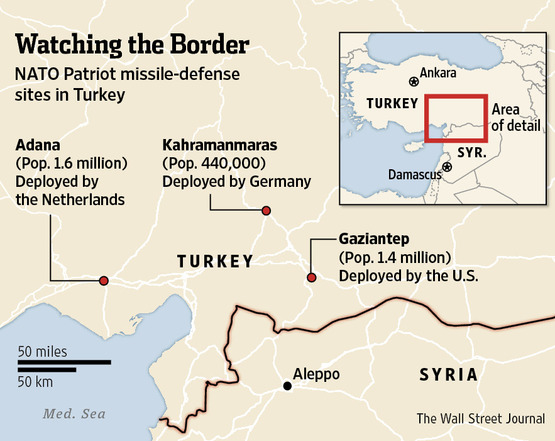
From Stephen Fidler, Wall Street Journal: On a windswept plateau overlooking this fast-growing city in the south of Turkey, just 30 miles from the Syrian border, an array of U.S. missile-defense launchers points south toward Syria, where a civil war rages.
The mobile missile-defense battery, which also includes a sophisticated radar that peers deep into Syria, started operations this week after being called in to protect Turkish cities against the possible threat of Syrian ballistic missile attacks.
This is as far as North Atlantic Treaty Organization ground forces have come yet to getting directly involved in the Syrian conflict. Officials insist they have no plans to go further, or to use the batteries here to enforce a Syrian no-fly zone. . . .
Officials said the deployment is of symbolic significance, as a demonstration of solidarity with an ally that boasts the second-largest military in NATO after the U.S. The guarded response reflects the reluctance of many NATO governments to be drawn into the Syrian conflict—and leaves some important population centers in the south of Turkey unprotected from possible missile strikes. . . .
The U.S. contingent is sited deep inside an enormous Turkish military base on the outskirts of Gaziantep. The U.S. soldiers here, normally based in Fort Sill, Okla., as part of the 3rd battalion of the U.S. 2nd air defense artillery regiment, work in gray combat uniforms, their equipment mostly in desert camouflage that matches the rocky outcrops.
Their missile launchers contain both older-technology PAC-2 missiles designed to explode near an incoming missile and destroy it with shrapnel, and the newer PAC-3, a slimmer missile programmed to slam into an incoming rocket. Each truck-hauled launcher can carry four PAC-2 missiles, or 16 PAC-3s. . . .
The Dutch have been in Turkey before, with missile-defense batteries deployed in 1991 and 2003 during the first and second Gulf wars. For Germany, this is the first foreign deployment of its Patriot missile-defense capabilities.
NATO and Turkish military spokesmen repeat that the deployment is purely defensive in nature, and isn’t a prelude to the establishment of a no-fly zone in Syria. They are also keen to emphasize that Turkey has its own robust air-defense capabilities that would allow it to deal easily with any threat from Syrian aircraft. What it lacks is the sophisticated antimissile capability provided by the Patriot systems, built by Raytheon of the U.S. . . .
Putting the batteries on Turkish military bases means the allies don’t have to bring in more troops to protect their forces. But it required some adjustments by Turkey’s male-dominated military: accommodating women such as Capt. Leslie Dembeck, who commands the first battery to go operational above Gaziantep. (graphic: Wall Street Journal)
Image: wsj%202%206%2013%20Turkey%20Patriot%20bases.jpg
